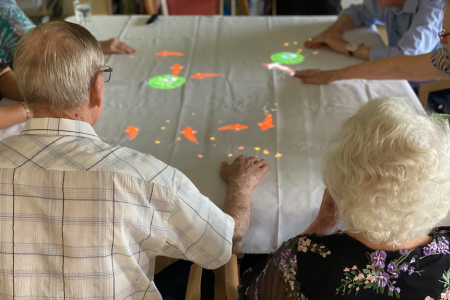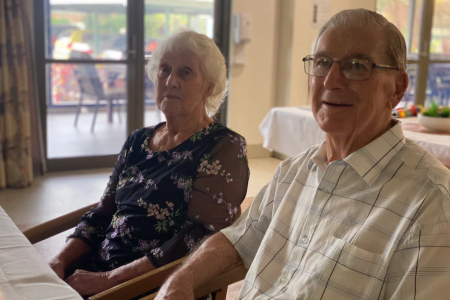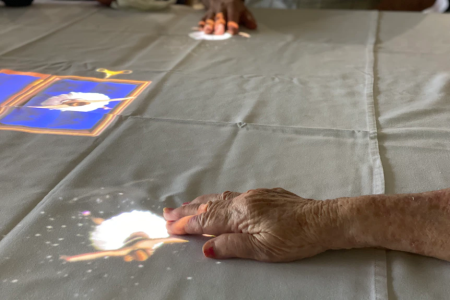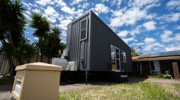Discover the 'Magic Tables' transforming the lives of dementia patients in aged care
At Seniors Discount Club, we pride ourselves on sharing valuable information, tips, and stories, and today we have something quite extraordinary to share with our readers. Imagine a table that can change the lives of aged care residents, especially those living with dementia. Sounds too good to be true, right? Well, it's not only possible but already making a difference in the lives of many seniors right here in Australia!
'Magic tables', or 'tovertafels' as they're called in Holland, where they were first created, are helping to bring joy and mental stimulation to those who need it most. Mercy Place Aged Care in Cairns has recently introduced these unique tables to its facilities, and the results have been nothing short of magical.
Featuring a small, mounted box that projects vivid images onto a table's surface, the magic tables use infrared motion sensors to allow individuals to interact with projected images using just their hands. The fluorescent orange fish images move gracefully across the table as the residents eagerly reach out their hands to touch them, clearly delighting everyone in the room.
The primary goal of the tovertafel is to encourage social interaction and mental stimulation in aged care residents with mobility constraints and those who may be socially withdrawn. The magic table seems to be ticking all the boxes in that regard.

One patient, Bernice Mark, who has dementia, has seen a positive change in her daily routine since the introduction of the magic table. Her husband, John Mark, shared, 'She takes an interest in it, which is quite unusual. She just generally sits with her eyes shut, but she is getting some real enjoyment out of it.'
Wyanita Christensen, Mercy Place's lifestyle coordinator, shared her observation that the magic table made a remarkable difference in their clients. 'It's very intuitive. You don't need any skills or language barriers,' Ms Christensen said. 'This has the ability to calm or stimulate people. We've only had it for three weeks, but we've had a really good response [from the residents] so far.'

Jacki Little, a researcher and occupational therapist from the University of Queensland, agrees that it's essential to explore different options for people living with dementia. 'It is important that we shouldn't exclude people living with dementia from using technology,' she said.
However, Little also advises caution to ensure the magic table doesn't cause confusion or distress. 'For some people, it could add to the feeling that they don't trust their environment, so when technology like this is being used, it is important that there are people who can support the interactions and ask the participants how they are finding it,' she said.
With eight Mercy Health Residential Aged Care homes currently using the magic table, it could soon reach aged care facilities nationwide. As long as the technology is implemented mindfully and with proper support, it has the potential to improve healthcare outcomes, increase safety, and enhance emotional engagement for those living with physical and/or cognitive ailments.
The integration of advanced digital and electronic technologies in aged care facilities is an avenue of research actively pursued by agencies, stakeholders, and governments, and it has seen numerous benefits, including reduced staff stress, improved management and monitoring of resident health, better accuracy in tracking resident schedules and prescription histories, and increased emotional engagement through audio and visual equipment.
By creating a more conducive living environment in which residents can receive care at their own pace, technology can significantly improve the quality of life of those in aged care facilities and allow caregivers to provide more time for meaningful interactions with residents.
 So, members, if any friends or loved one’s could benefit from this, you might like to consider discussing with their aged care providers the possibility of introducing 'magic tables'. Remember, every day holds the potential for a little bit of magic! We’d love to hear your thoughts on this in the comments section below.
So, members, if any friends or loved one’s could benefit from this, you might like to consider discussing with their aged care providers the possibility of introducing 'magic tables'. Remember, every day holds the potential for a little bit of magic! We’d love to hear your thoughts on this in the comments section below.
'Magic tables', or 'tovertafels' as they're called in Holland, where they were first created, are helping to bring joy and mental stimulation to those who need it most. Mercy Place Aged Care in Cairns has recently introduced these unique tables to its facilities, and the results have been nothing short of magical.
Featuring a small, mounted box that projects vivid images onto a table's surface, the magic tables use infrared motion sensors to allow individuals to interact with projected images using just their hands. The fluorescent orange fish images move gracefully across the table as the residents eagerly reach out their hands to touch them, clearly delighting everyone in the room.
The primary goal of the tovertafel is to encourage social interaction and mental stimulation in aged care residents with mobility constraints and those who may be socially withdrawn. The magic table seems to be ticking all the boxes in that regard.

Bernice is being watched by her husband, John Mark, as she uses the ‘magic table’. Source: ABC Far North: Alexandra Treloar
One patient, Bernice Mark, who has dementia, has seen a positive change in her daily routine since the introduction of the magic table. Her husband, John Mark, shared, 'She takes an interest in it, which is quite unusual. She just generally sits with her eyes shut, but she is getting some real enjoyment out of it.'
Wyanita Christensen, Mercy Place's lifestyle coordinator, shared her observation that the magic table made a remarkable difference in their clients. 'It's very intuitive. You don't need any skills or language barriers,' Ms Christensen said. 'This has the ability to calm or stimulate people. We've only had it for three weeks, but we've had a really good response [from the residents] so far.'

John and Bernice Mark engage in game sessions on the ‘magic table’ as a shared activity. Source: ABC Far North: Alexandra Treloar
Jacki Little, a researcher and occupational therapist from the University of Queensland, agrees that it's essential to explore different options for people living with dementia. 'It is important that we shouldn't exclude people living with dementia from using technology,' she said.
However, Little also advises caution to ensure the magic table doesn't cause confusion or distress. 'For some people, it could add to the feeling that they don't trust their environment, so when technology like this is being used, it is important that there are people who can support the interactions and ask the participants how they are finding it,' she said.
Technology Integration in Aged Care Facilities
The use of advanced technology in aged care facilities, such as automated systems, monitoring equipment, and interactive tools like the ‘tovertafel’, has revolutionised how we approach dementia care.With eight Mercy Health Residential Aged Care homes currently using the magic table, it could soon reach aged care facilities nationwide. As long as the technology is implemented mindfully and with proper support, it has the potential to improve healthcare outcomes, increase safety, and enhance emotional engagement for those living with physical and/or cognitive ailments.
The integration of advanced digital and electronic technologies in aged care facilities is an avenue of research actively pursued by agencies, stakeholders, and governments, and it has seen numerous benefits, including reduced staff stress, improved management and monitoring of resident health, better accuracy in tracking resident schedules and prescription histories, and increased emotional engagement through audio and visual equipment.
By creating a more conducive living environment in which residents can receive care at their own pace, technology can significantly improve the quality of life of those in aged care facilities and allow caregivers to provide more time for meaningful interactions with residents.
Key Takeaways
- 'Magic tables' or tovertafels, are being used in aged care facilities to help residents with dementia engage in social interaction and mental stimulation.
- The technology consists of a mounted box projecting images onto a table that residents can interact with using motion sensors.
- The magic table has made a significant difference in the daily routines and enjoyment of dementia patients in aged care homes.
- While there is no one-size-fits-all approach to activities for those living with dementia, experts agree that offering a variety of technological options can help enhance their quality of life.








